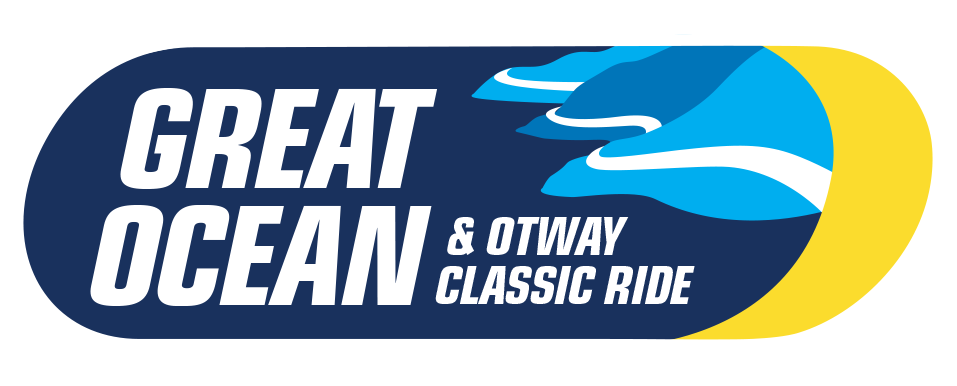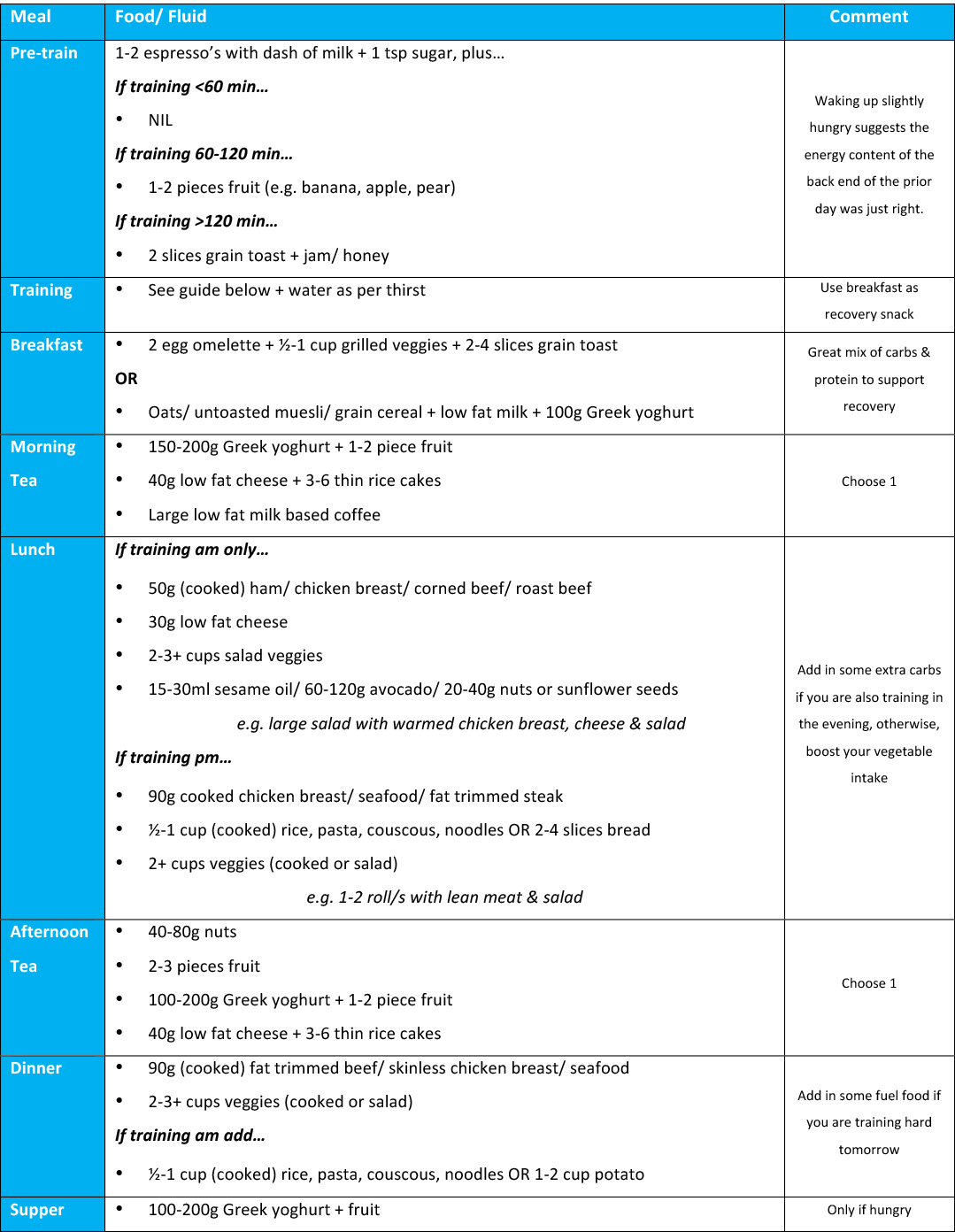Saturday 16 April 2016, Torquay
Training Nutrition
Great Ocean & Otway Classic Ride Training Nutrition powered by Etixx Sports Nutrition
By Dr Gary Slater
Etixx Sports Nutrition is proud to be a partner for the 2016 Great Ocean & Otway Classic Ride. Etixx will be hydrating, fuelling and helping riders to recover on the day with Etixx Isotonic + Etixx Energy Bars on course as well as Etixx Recovery Shake in the Recovery Zone.
The meal plans that follow have been developed to help you optimise fuelling & recovery of training over the next 4-6 weeks. By doing this you’ll be able to do more work in training while limiting the accumulation of fatigue over a training week, ensuring you get to the 2016 Great Ocean and Otway Classic ride in the best possible condition. The plan should be considered a guide only as individual energy and nutrient needs will vary. The meal plan has been prepared with the following objectives in mind…
1. Adjust your energy intake to reflect training loads (energy expenditure)
Left to their own devices, most athletes eat the same day to day & thus their energy intake also remains the same. This is despite energy expenditure varying significantly. Think about the days you have structured training compared with a lazy day at home. Unfortunately for many people, their appetite isn’t a sensitive guide to changes in energy expenditure. This means you can tend to over-eat on low training days but also under-eat on heavy training days, compromising fuelling & recovery while also limiting favourable changes in body composition. Instead, you should allow your energy intake to increase on heavy training days while moderating energy intake on training free days. As carbs are the main fuel used during training, it makes sense that your carb intake should be the adjusted to reflect training loads. This may be as simple as adding in a pre-training snack, during training nutrition support and a post-training snack. Outside of this, simply changing the ratio of veggies to carbs on your plate can go a long way to achieving this… more carbs & less veg on heavy loading days & less carbs with a bigger veg serve on lighter loading days.
2. Orientate more of your daily carbohydrate intake around training
Rather than fear carbs, you should look at carbs as a friend when used strategically as they help you do more in a training session, stimulating better training adaptations. The key is getting their timing right & adjusting how much you have based on your daily energy needs. It makes good sense to orientate more of your daily carb intake around training, including your pre & post training snacks. This gets petrol to the muscles when they need it most while also allowing you to moderate intake at other times of the day. For longer training session i.e. 60-90 min plus, taking on board additional carbs during the session via a sports drink like Etixx Isotonic, Etixx Energy Gel or Etixx Energy Bar may offer a further performance boost.
3. Base your meal plan on 3 main meals & at least 2 mid meal snacks
It’s often assumed smaller, more frequent meals help keep your metabolism up & thus assist with weight management. Recent research has confirmed this is NOT true but there are several reasons why this style of eating is likely more beneficial for active individuals like cyclists. Eating more often provides regular energy top ups & prevents you from getting over hungry… a common mistake that leaves you vulnerable to the ‘hunger bear’ who eats everything in sight, resulting in over eating. Including pre- & post-training snacks gets fuel to the muscles when they need it most, maximising the bang for your buck.
4. Include pre & post-training snacks
A pre-training snack/meal rich in carbs has repeatedly been shown to increase work capacity during training sessions, especially longer &/or more intense sessions. The specific snack you choose will vary based on your daily energy needs, available resources, taste preferences & location. Convenient choices include sandwiches & rolls, fruit loaf & other flour based snacks, cereal, fruit in all of its forms, dairy snacks or commercially available sports foods like the Etixx Energy Bar.
In recovery after training, your muscles are particularly sensitive to carbs & protein. The carbs help fast track restoration of muscle energy levels so your body is ready to back up for the next session while the protein helps to turn on muscle repair while also making you feel full. You should aim for a carb intake of ~1g/kg body mass within 30 min of finishing training & match this with a protein serve equal to 0.25g/kg body mass i.e. 60-70g carbs & 15-20g protein for a cyclist 60-70kg. For those on tighter energy budgets, consider bringing forward your next meal, rather than adding in a snack, & then going to your next main meal. If your next session isn’t for ≥8 hours, timing of intake is less critical & you can simply use your appetite to guide you.
Get into the routine of periodically weighing yourself before & after training, especially while it still remains warm in coming weeks. Any weight loss experienced is a reflection of the mismatch between fluid intake & sweat losses. Whatever you lose during training, aim to ingest 150% of this over the next 2-3 hrs to promote effective rehydration e.g. if you lose 1 kg during training, ingest 1.5L fluid over the next few hrs. Drinking with meals is particularly beneficial, as it takes advantage of the salt naturally found in food to better retain the ingested fluid. Etixx Recovery Shake contains Whey protein isolate, carbohydrates, vitamins, minerals and creatine to assist your pst-ride recovery.
5. Include a small serve of protein rich food with each meal & snack
Protein rich foods tend to make meals & snacks more filling. Given this, it makes good sense to include a small serve of protein rich food at each meal & snack throughout the day. You don’t need to follow a high protein diet, merely one that has a better distribution of your protein intake. Most Aussies back end their protein intake; consuming half or more of their daily protein intake at dinner. Instead, keep your serve of protein rich food at dinner to no more than a deck of cards (about 100-120g), add some lean ham & low fat cheese to your sandwich at lunch, 2 poached eggs at breaky & include a natural Greek yoghurt as a great mid-meal snack. You will feel fuller for longer & avoid those nasty hunger pangs that can wreak havoc with your meal plan.
These 15-20g (aim for 0.25g/kg body mass i.e. ~20g for a 70kg person) hits of protein at each meal & snack also help maximise muscle repair after training e.g. 400g flavoured OR 200g low fat Greek yoghurt, 100g raw (120g cooked) meat/poultry/seafood, 60g low fat cheese, 90g tin tuna, 175g egg whites or 3 large eggs, 60g Etixx Complex Training Shake, 50g Etixx Recovery Shake plus 15g Etixx High Protein Shake. Bigger hits of protein than this don’t offer any further benefits; you are better off allocating more of your plate real estate to some energy restoring carbs.
6. Make use of energy (& nutrient) rich drinks if your appetite subsides post-training
If you’re trying to maximise the satiety of your diet (i.e. how filing it is) it’s wise to eat your calories, avoiding drinks that contain empty calories like soft drink, cordial, juice & sports drinks. However, hard training sessions can knock your appetite around, leaving post-training snacks difficult to stomach, despite their importance in kick starting the recovery process when recovery times a short. If this happens to you, feel comfortable reaching for a nutritious drink (like a low fat flavoured milk or meal replacement powder like Etixx Complex Training Shake or Etixx Recovery Shake) that simultaneously helps meet carb, protein, electrolyte & fluid recovery needs.
7. Get organised… eating for performance demands that you are organised & have ready access to food
Following a meal plan that includes regular meals & snacks demands that you are organised, having access to foods throughout the day in-line with your meal plan. Furthermore, the more meals & snacks that come from home, the more successful you’ll likely be. It gives you absolute control over what goes into your mouth. Doing a ‘cook up’ 1-2 times a week ensures you have access to great quality options every day. It takes virtually the same time to cook up enough for 4 meals as it does just 1 so make the most of the time you invest in the kitchen. If you know what you have to eat tomorrow, why not pack up your meals & snacks for the next day so that all you need do is pack them into an esky on the way out the door. This can be especially important for those individuals juggling many commitments, including family, work & training. Aim to do one main shop a week but realise you may need to get to the shops once more to pick up additional fresh produce. And fresh is best….not only for nutritional value but also taste & you have to enjoy what you eat.
Training Nutrition Support
- If session < 60 min… water only
- If session 60-120 min… 30g carbs/ hr
- If session 120-180 min… 60g carbs/ hr
- Sessions >150 min… up to 90g carbs/ hr*
- 30 g carbs equates to…
• 1 large banana
• 1 Vegemite sandwich
• 500 ml Etixx Isotonic
• 1 Etixx Energy Bar
• 1 Etixx Energy Gel
*To be able to absorb and metabolise carbs at such a high rate, a product with multiple carbohydrate sources should be used. The Etixx Isotonic Watermelon flavour has the ideal blend of 2:1 glucose to fructose, a ratio of carb types repeatedly proven to boost fuel availability and most importantly, performance. Alternatively, a combination of the Etixx Isotonic (watermelon) and an Etixx gel can be used when high rates of fuel intake are warranted.
These same principles can be used to fuel your performance on the day of the classic.

